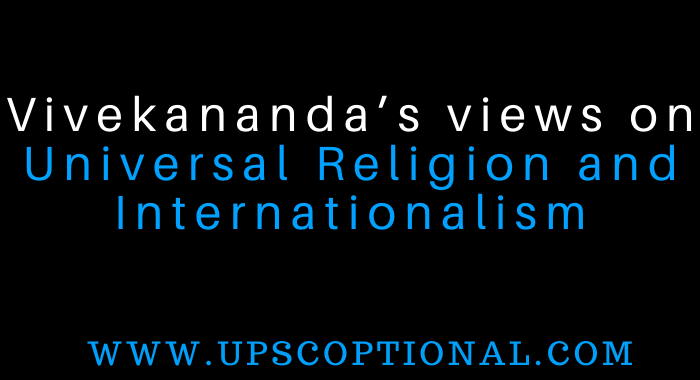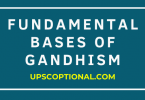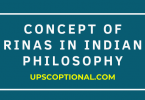Write a short note on Vivekananda’s views on Universal Religion and Internationalism.
Answer – Religion, according to Vivekananda, does not consist in subscribing to particular creed or faith but in spiritual realization. The divinity within must be brought be brought to one’s perpetual level. He believed that in spiritualism lies India’s greatness.
This spirituality does not mean the changing manners and customs, but the idea of “oneness of all the infinite, the idea of impersonal, the wonderful idea of the eternal soul of man, of the universe.” This is what the Vedanta tells us and that was the reason the Vivekananda accepted it sound metaphysics and universality.
The Vedanta fulfils the objectivity of all religious quest. It according to Vivekananda, consists of eternal principles which stand upon their own foundations without depending upon the authority of persons or incarnations. It alone can be regarded as a Universal Religion, for it teaches principles, not persons. No religion built upon the authority of a person or persons can be universally accepted by all the races of mankind.
The sanctions of the Vedanta is the eternal nature of man, already existing and already attained. “As it kindles the fire of spiritualism of creeds and dogmas. It thus aims at serving the whole of mankind and creating world brotherhood.
Besides Vedanta, Vivekananda’s faith in international unity and brotherhood was also strengthened by his understanding of the role of science. Science is bringing the whole world together and accelerating universal unity.
He pointed out that, “The old lines of demarcation and differentiation are vanishing rapidly.”
Electricity and steam power are placing the different parts of the world in inter – communication with each other.
Hence, both his philosophy of the Vedanta and his understanding of science revealed to him that nations are not different from the universe. He was of the firm opinion that all individuals and nations are not different from the universe. He was of the firm opinion that all individuals and nations were parts of the Universal Existence, Brahman.
He hoped that nations by realising their individual nature would also realise the nature of universal unity. He firmly held the view that neither the Vedanta nor science negates the existence of different nations. Thus, he affirmed international unity and brotherhood through national diversities and religious and cultural varieties.






